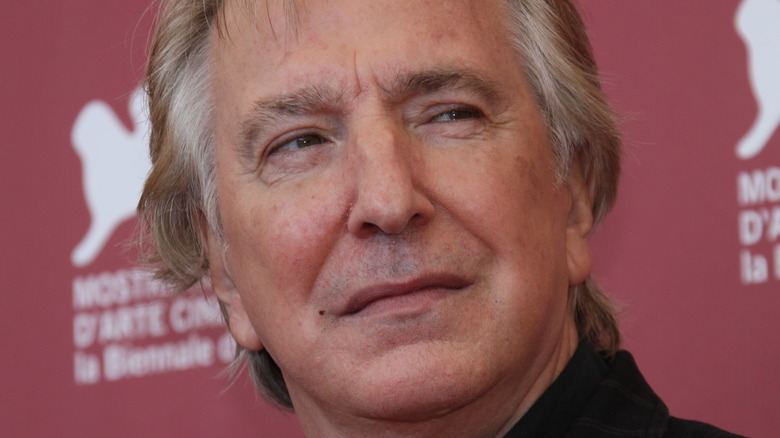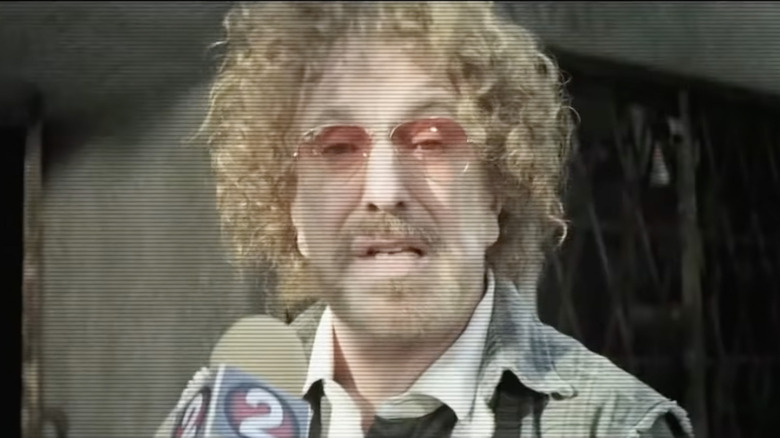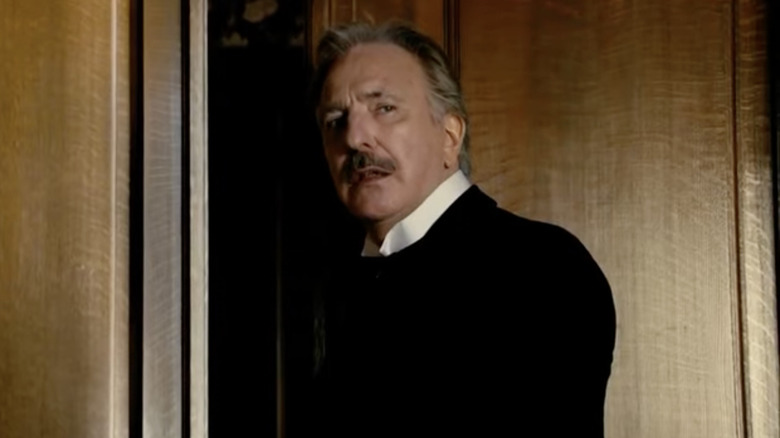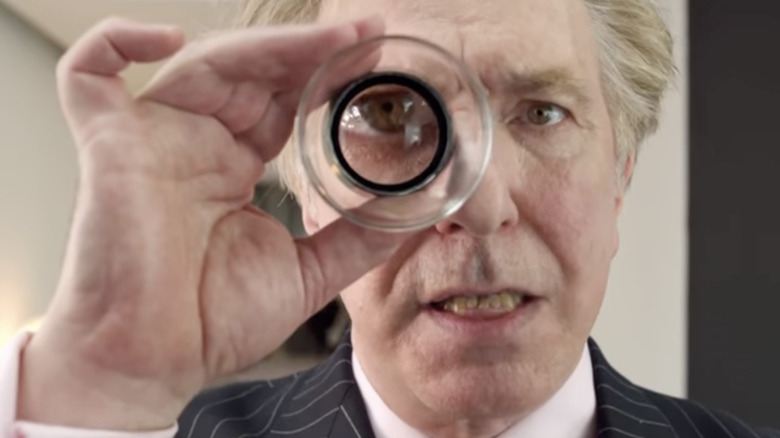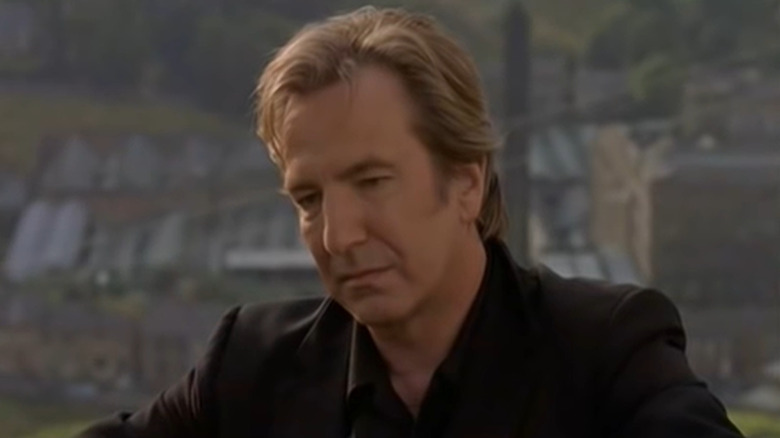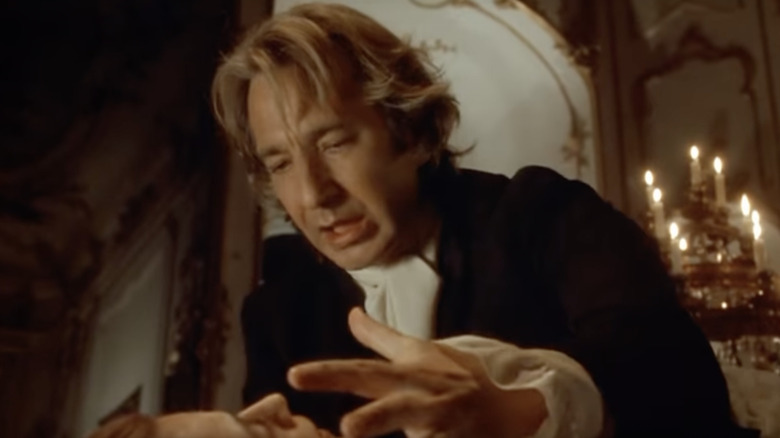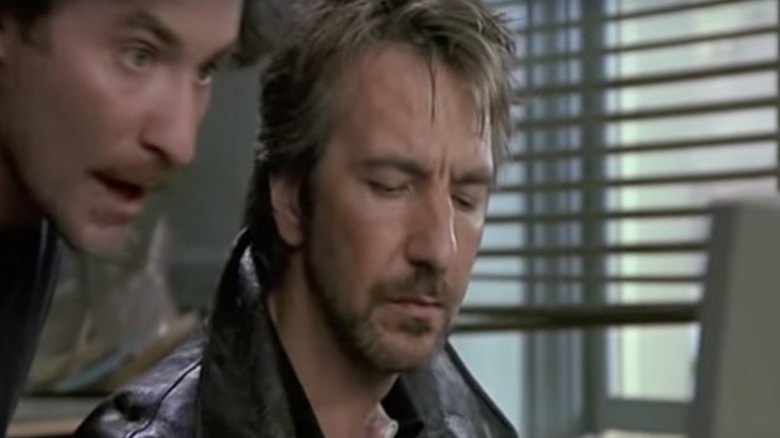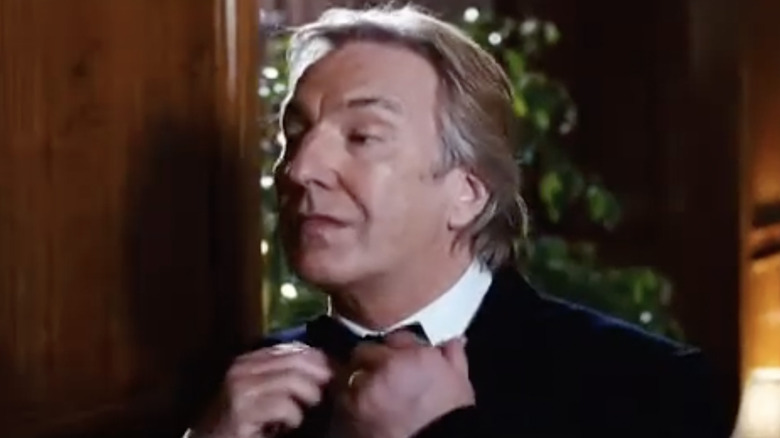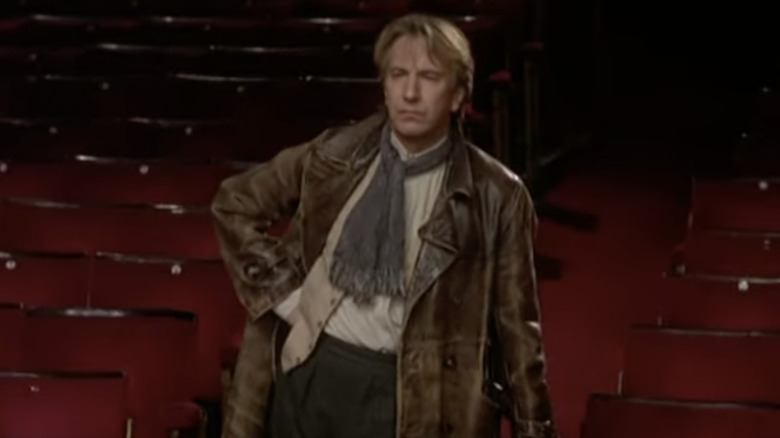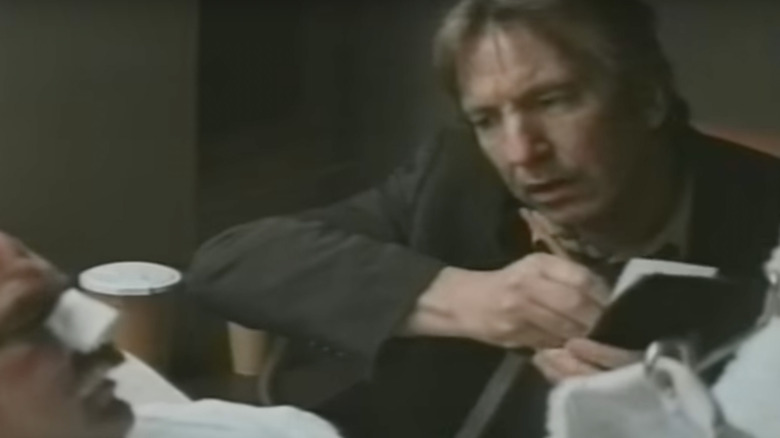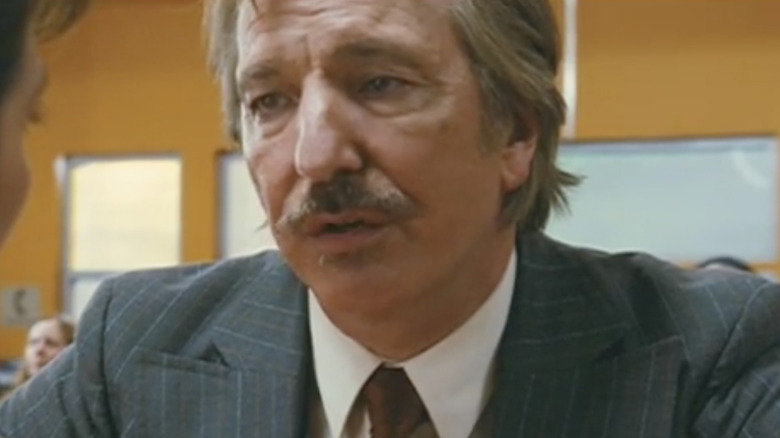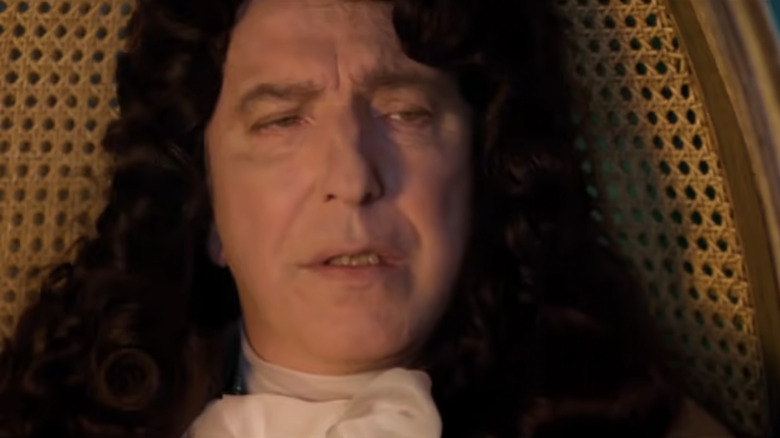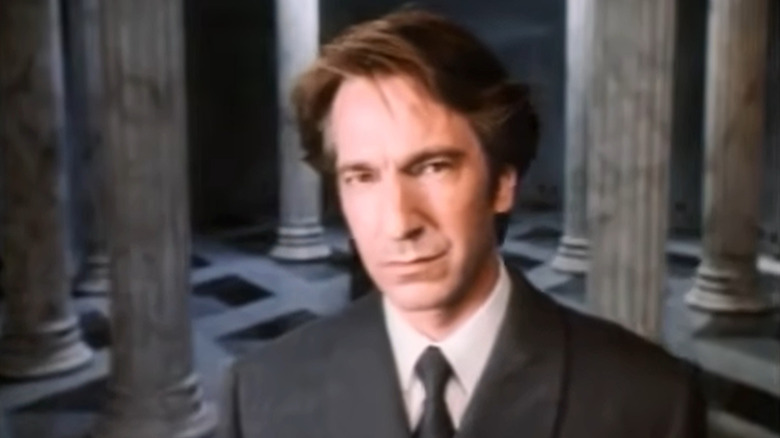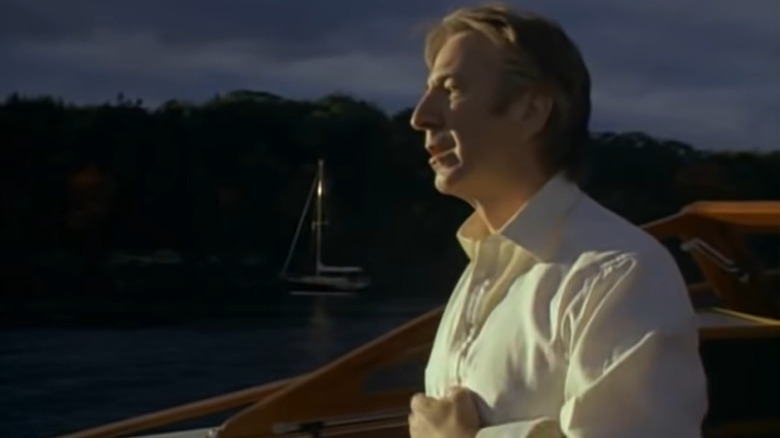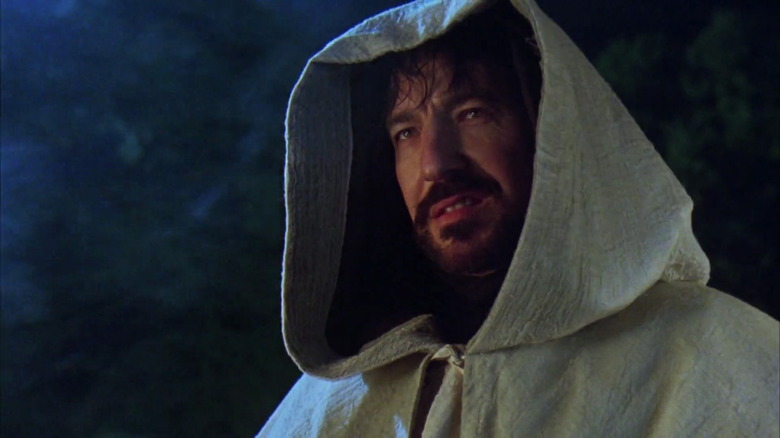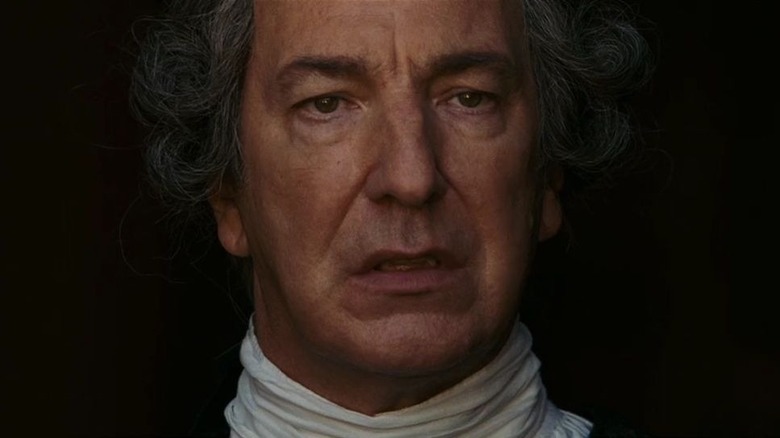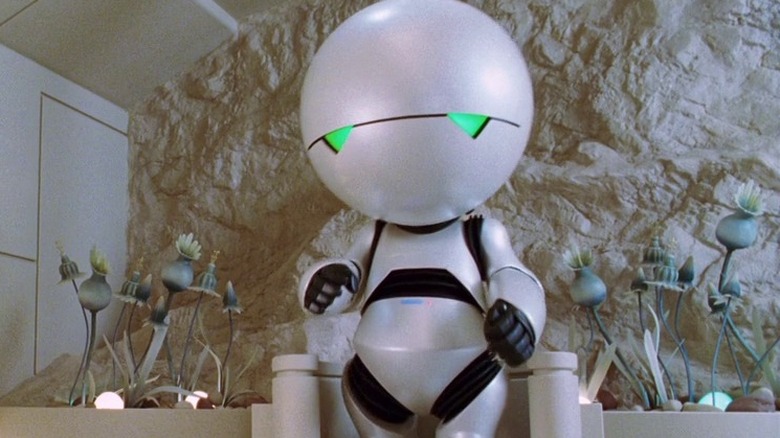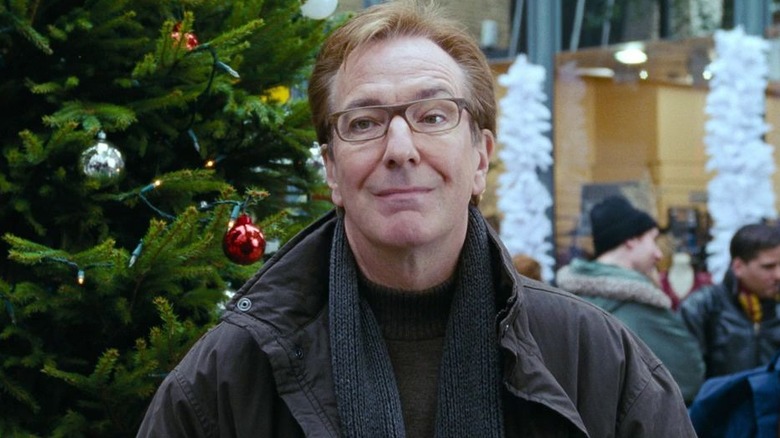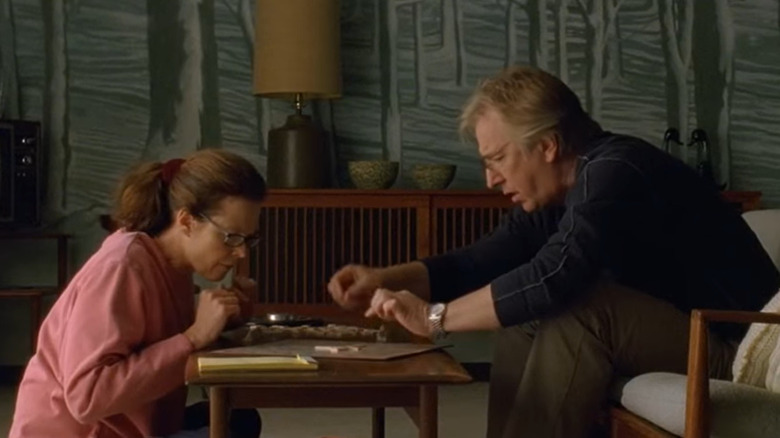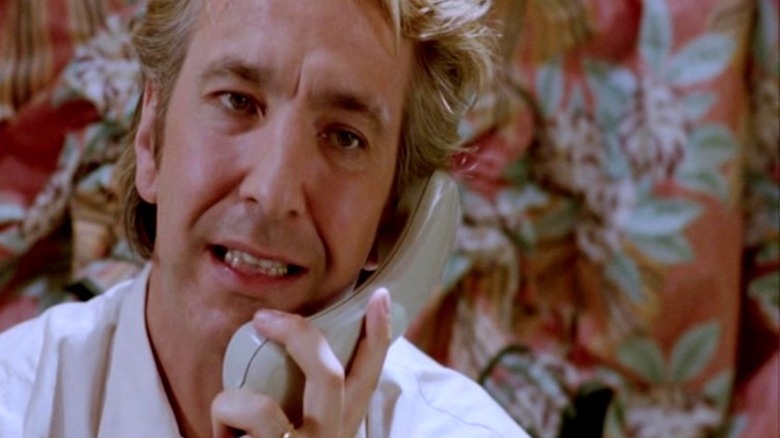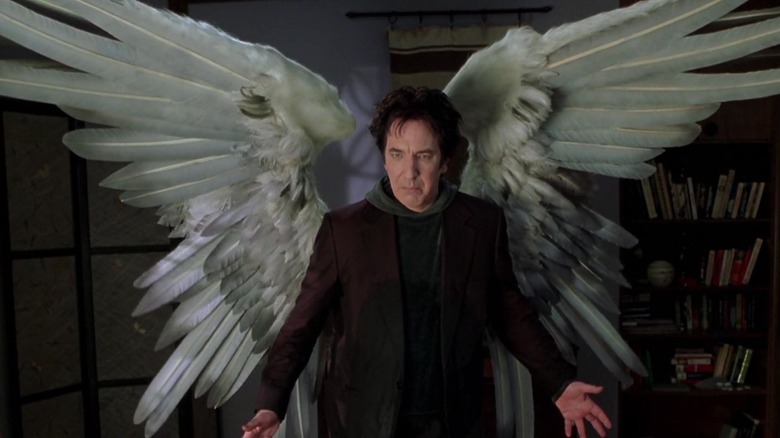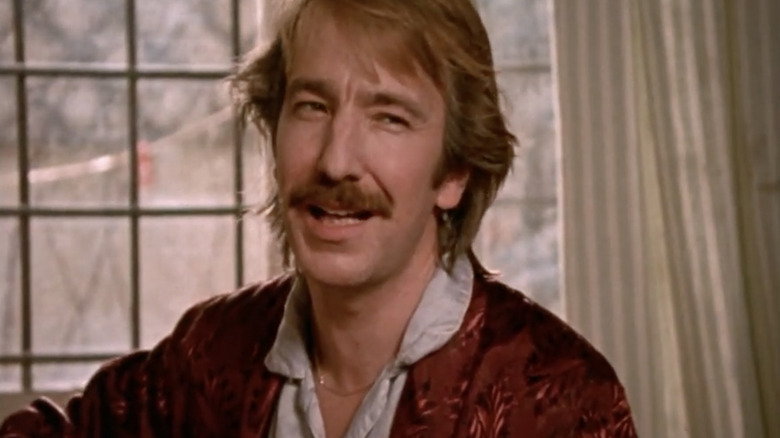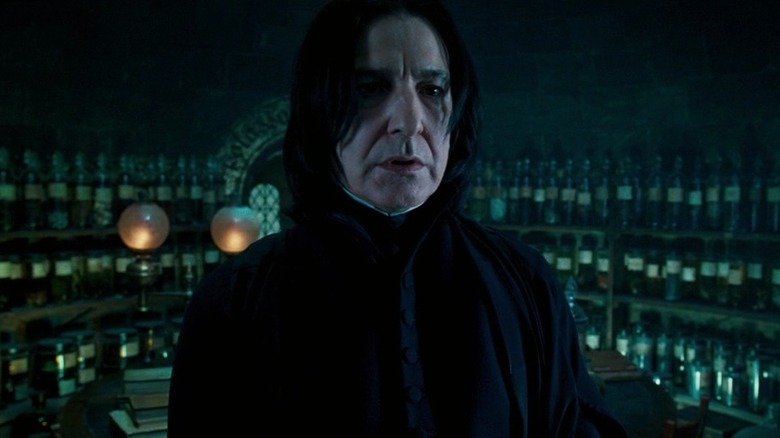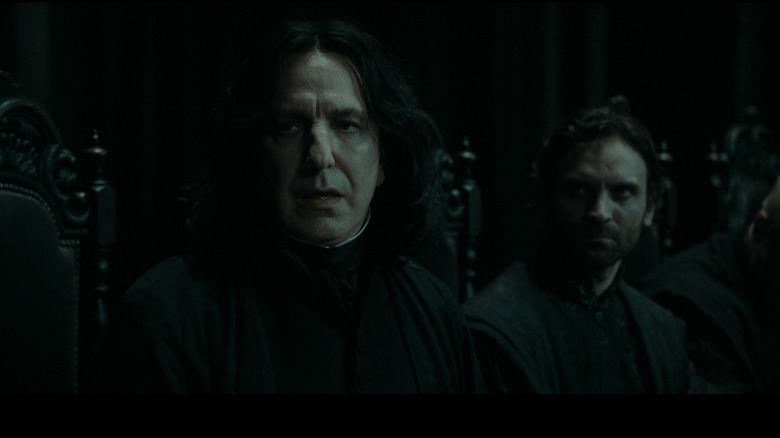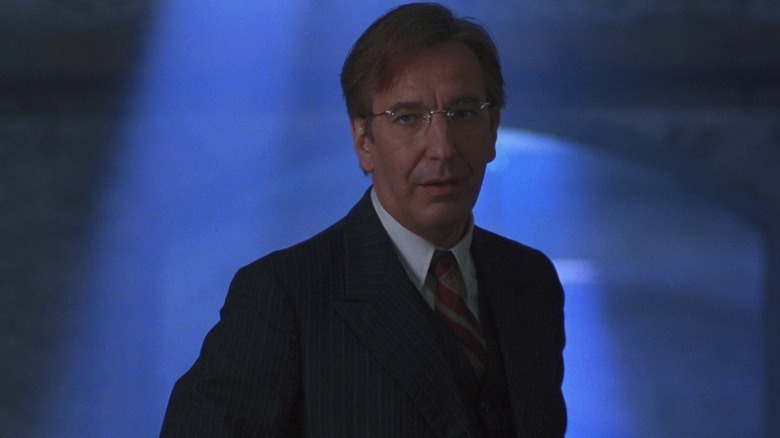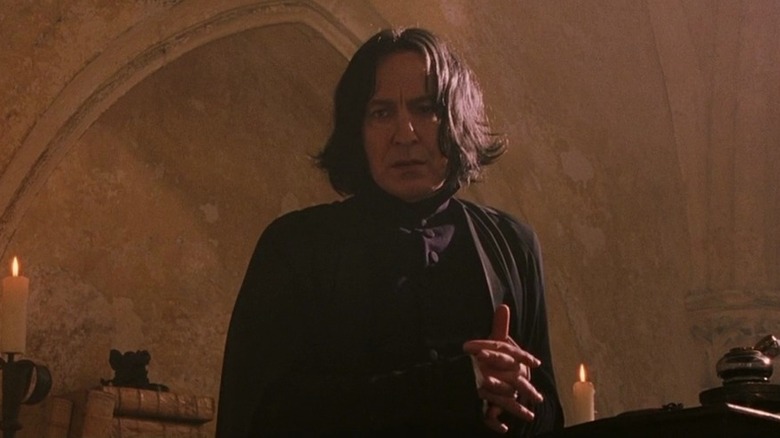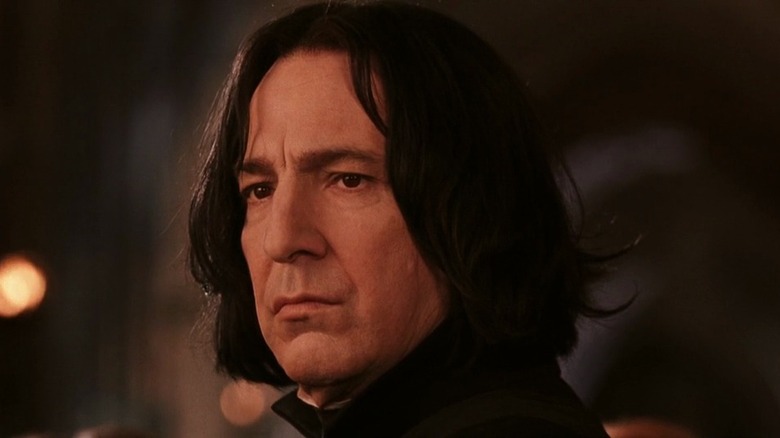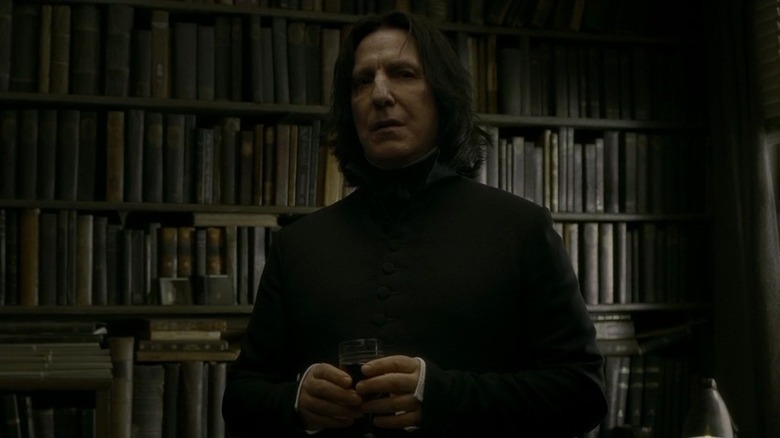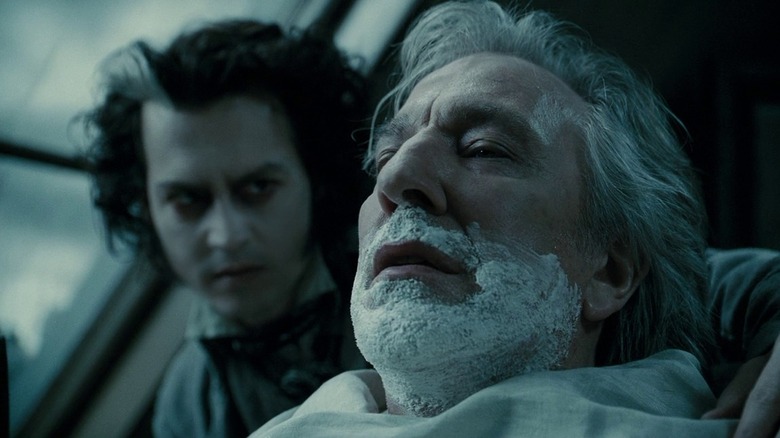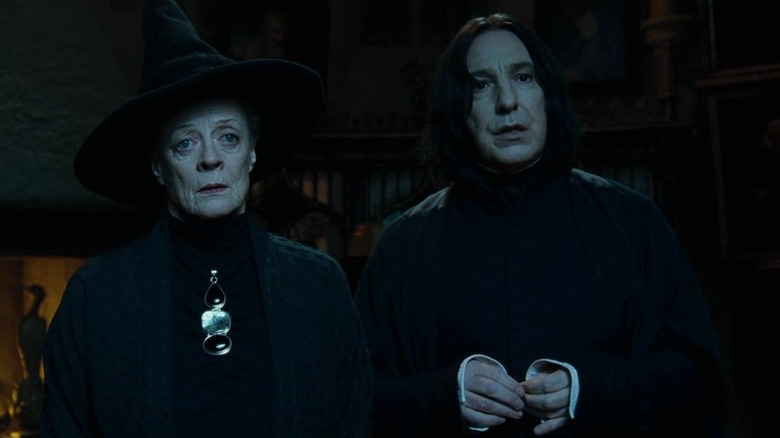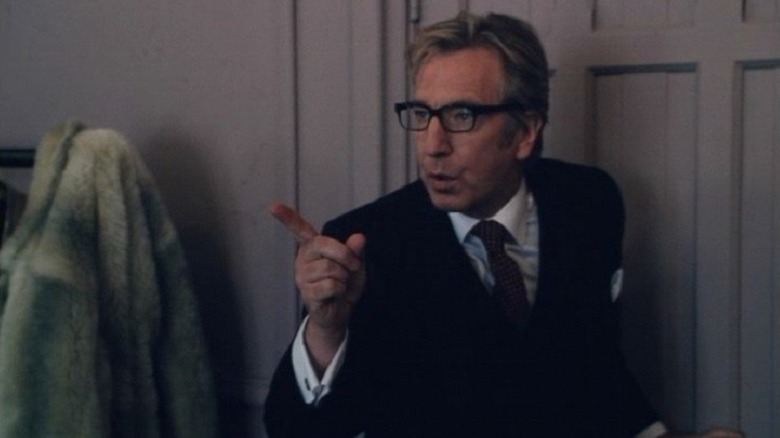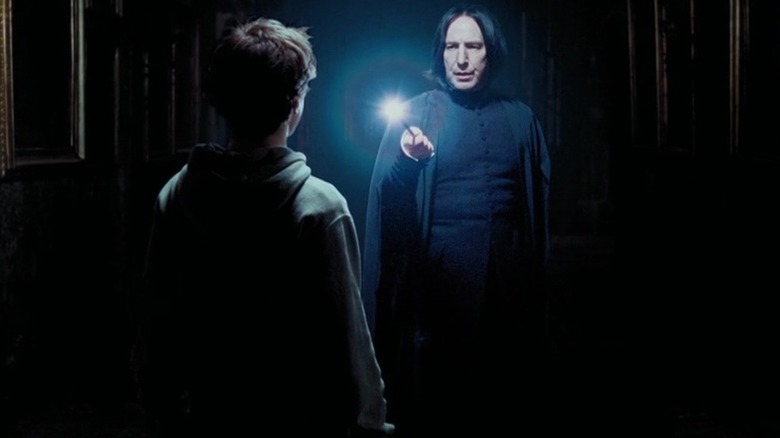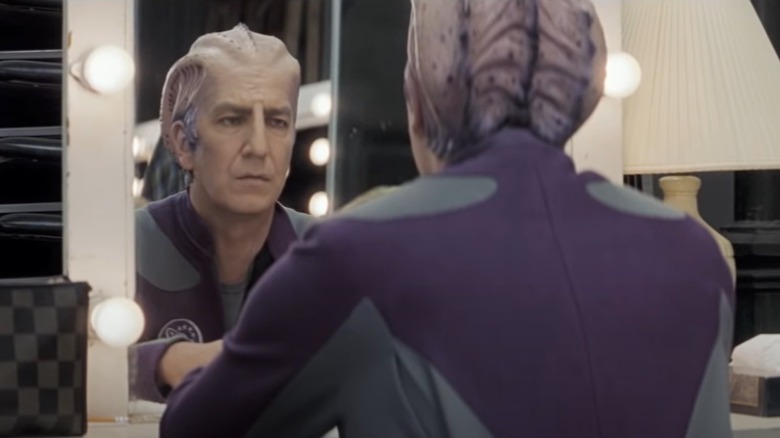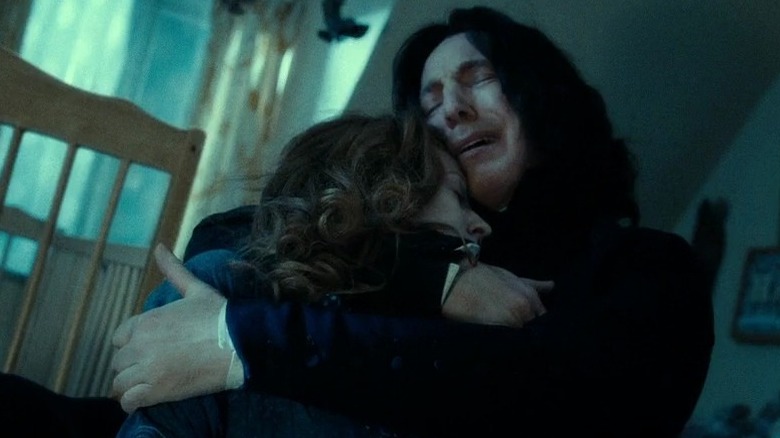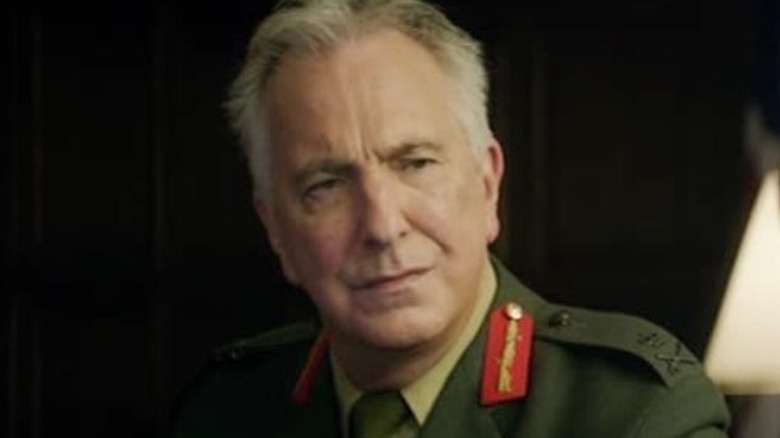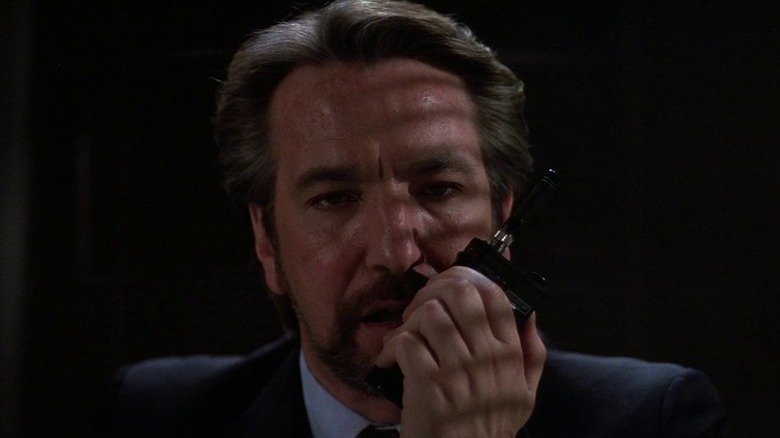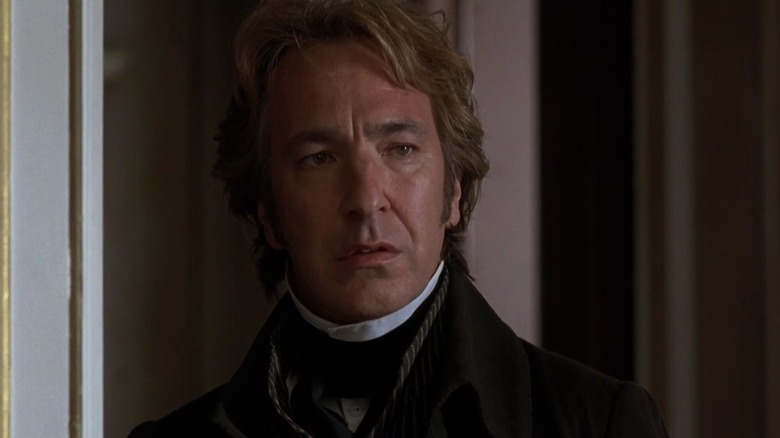Every Alan Rickman Movie Ranked Worst To Best
There are a lot of celebrity deaths that have hit us hard over the years, but one of the biggest blows was losing Alan Rickman in January 2016. Rickman was a treasure. He could shine in even the smallest of roles — as The Atlantic put it, he "spent the bulk of his movie career being brilliant in supporting parts that don't need brilliance" — and effortlessly command the screen whenever he took the lead. He managed the difficult trick of being distinctive and flexible at the same time. There's a certain kind of drawling, deliberate Alan Rickman line-delivery that's rightfully iconic, but he could use it for villains or noble heroes, larger-than-life characters or ordinary ones, comedies or dramas ... and it was always believable, riveting, and exactly right.
As The Guardian noted in his obituary, Rickman's success started on-stage, and theater was a natural fit for his powerful charisma. When he crossed over into film, he started with a bang. His famous "Die Hard" villain was his first on-screen role, and he snagged it only two days after showing up in Hollywood. Years later, Rickman left us with an exciting, diverse filmography full of highlights and bold, unusual choices — even if some of the films didn't exactly match up with his incredible performances. Let's take a look at his major movies, counting down from the worst to our pick for number one.
37. CBGB
For years, the New York club CBGB hosted some of the most significant and cutting-edge music around. Far Out notes some of the performances that helped define CBGB — Patti Smith, Talking Heads, The Ramones, Blondie — and a complete list would be overwhelming. This is where music happened.
The best way to celebrate CBGB's punk music legacy is to listen to some of the club's greatest hits and not, under any circumstances, watch its aggressively anemic 2013 biopic. "CBGB" takes an electric milieu humming with musical genius and squeezes all the life out of it, resulting in a movie that, per Flavorwire, "isn't even interesting enough in its badness to become a camp classic." It's not even redeemed by its lead performance from Alan Rickman, who plays CGBG founder and revamper Hilly Kristal. Rickman is certainly competent in the role, but he doesn't bring anything to the table we haven't seen from him before in better movies. If you have to go anywhere near this one, just pick up the soundtrack and call it a night.
36. A Promise
Regrettably, the promise at the heart of "A Promise" is not the filmmaker pledging to keep the audience entertained.
Instead, it refers to the vow separated lovers Friedrich Zeitz and Charlotte Hoffmeister — married to Friedrich's aging mentor, Karl — make to someday reunite and build a life together. Originally, their promise is only intended to cover Friedrich's business trip to Mexico, but when World War I breaks out and keeps him from coming home to Germany, their love and loyalty are tested to their limits.
All of that should add up to a moving, bittersweet romance, especially in the hands of three actors as capable as Richard Madden, Rebecca Hall, and Alan Rickman. Hall and Rickman do manage to bring a much-needed liveliness to the proceedings. The Guardian calls Hall "as coolly measured and affecting as ever" and Rickman "dependably jaded," with one of his line deliveries serving as the "saving attraction of this drab affair." Madden is unusually weak, though, and his chemistry with Hall amounts to nothing more than a damp sputtering-out. You can't have a memorable romance with this little on-screen chemistry.
35. Gambit
"Gambit" should work — it boasts a Coen brothers script and a round-up of some of our favorite actors, including Alan Rickman, Cameron Diaz, Colin Firth, and Stanley Tucci — but it winds up completely lacking any fizz, which is the one thing every comic art caper film needs. It's a shame because we certainly want to watch the movie "Gambit" could have been. We just don't want to actually watch this "Gambit," and neither do you. (The original, with Shirley MacLaine and Michael Caine, is still worth revisiting.)
Colin Firth plays put-upon curator Harry Deane, who hatches an elaborate scheme to trick his terrible boss, Alan Rickman's Lord Shabandar, into falling for a fake Monet. Harry puts the work in to try to pull all this off, even thinking to plant his "lost Monet" exactly where it could plausibly have been this whole time (but also exactly where it could easily have been missed), and he enlists an eccentric collection of allies. His plan even has a clever twist to it. Again, the elements for success are here — they're just not enough.
The Dissolve's Noel Murray grappled with the emptiness at the heart of "Gambit," writing, "It's as though the whole center of the film has been gutted, losing about 40 minutes of plot, along with everything that would've made the film more of a romantic comedy. In its place? Excruciatingly long sequences of farce." The result is an unfunny, patience-testing slog.
34. Blow Dry
"Blow Dry" is a likable film. It gathers up an impressive collection of actors — Alan Rickman, Bill Nighy, Natasha Richardson, and so on — and strives to tell a quirky and warmhearted story about a British hairdressing competition. With proper handling, it could be as funny as "Best in Show" or as meaningfully sweet as "Pride," two movies it vaguely resembles. Unfortunately, the film — unlike the hair in it — falls flat. As Empire's Emma Cochrane put it, "While it's hard to be mean about a film that has such obvious good intentions — in between the hair show it tackles an un-clichéd lesbian relationship, cancer, young love and the triumph of the underdog — it's also a tough call to praise something which is so lame and unfunny."
Worst of all, for our purposes, the movie misuses Rickman, who plays skilled barber Phil, who needs to learn to forgive his ex-wife and get along with her again. According to Variety, "Rickman's performance tends to turn Phil's chip-on-the-shoulder attitude into dull glumness." We can't usually accuse Rickman of sucking the air out of a room, but Phil genuinely does have that effect. Still, if you go in with low expectations, "Blow Dry" might muster enough mild dramedy charm to win you over.
33. Mesmer
The biopic "Mesmer" concentrates on a few particularly dramatic years in the life of Franz Anton Mesmer, the 18th-century German physician whose controversial beliefs — including harmonics, the healing power of hypnotism, and the necessity of a balanced magnetic force inside the human body — gained him both attention and scorn.
Outside of Alan Rickman's central performance, "Mesmer" is an acquired taste. As Variety's Leonard Klady said, "The film is a non-stop assault of contradictory tones, wicked asides, and outrageous style. It's a viewing challenge akin to an obstacle course." The movie's demands on your attention are exhausting but also perversely attractive: So it goes with most challenges, really. If the "obstacle course" aspect doesn't appeal to you, however, you may still want to watch the movie just for Rickman's sake. The Atlantic devoted a special retrospective piece to his awe-inspiring turn as Mesmer, saying, "He's not just brilliant here; he's great, bold to the point of folly: The performance constantly — breathtakingly — flirts with the overwrought and the ludicrous." This isn't the best movie Rickman's ever been in, but it may stand as the single best showcase of his virtuoso talent.
32. The January Man
The overly complicated film "The January Man" bills itself as a comic crime thriller, but it's not combining tones and genres as much as it's jumbling them up.
Rarely have so many talented people — Kevin Kline, Susan Sarandon, Rod Steiger, Harvey Keitel, Alan Rickman, Mary Elizabeth Mastrantonio, and more — worked together to achieve so little. Roger Ebert, fascinated by the mess of it all, wrote, "Nothing fits. Every role seems to have been faxed in from a different movie, and the actors are on such various planes of emotional intensity that sometimes you can catch them, right there on the screen, looking at each other in bewilderment."
The plot involves a disgraced NYPD detective (Kline) coming back to the force to investigate a string of serial killings. It sounds serious, but his demands for coming back include the chance to cook dinner for his ex-girlfriend, now his police commissioner brother's wife, and he ropes in a painter friend (Rickman) as his assistant. If we were the citizens of this movie's New York, we'd have some concerns. Don't worry, though. It all winds up solved, even if the eventual resolution involves so much baffling decoding that this criminal investigation feels more like solving a Rubik's cube that turns into a crossword puzzle. "The January Man" is trying to do a lot of things, and while it doesn't really succeed at any of them, its failures are at least colorful.
31. Nobel Son
We don't demand that movies always give us likable characters, but when a film opts for nearly wall-to-wall unpleasantness, it needs to execute all that awfulness with darkly comedic flair, substantial insight, or at least ceaseless entertainment. On that note, "Nobel Son" doesn't quite stick its landing.
Alan Rickman stars as Eli Michaelson, a chemist who's just been awarded the Nobel Prize. Before you congratulate him on any achievements that might better humanity, though, you should know that he's an egotistical monster whose family can't stand him — which is why it's hard to feel too bad for him when his son gets kidnapped with the Nobel Prize money as ransom. And that's only the starting gambit in the movie's lengthy series of plots and double-crosses.
As Slant puts it, "Nobel Sun" is "an absolutely abysmal crime flick ... [that] operates under the wretchedly false assumption that it can cover up its derivativeness, its absence of cleverness, and its complete absurdity with flashy sound and fury." But if "complete absurdity" can be a draw for you instead of a deal-breaker, the movie's sheer wildness can be entertaining. Rickman is also giving it his all here, and he gets great support from actors like Mary Steenburgen. This much black-hearted charm can go a long way.
30. An Awfully Big Adventure
Sardonic, chilly, and full of bitter real-life darkness, "An Awfully Big Adventure" explores its characters' unhappiness in a way that will inevitably leave some viewers restless or repelled. If you can take the cynicism, however, the film has a lot to offer, including strong performances and sophisticated, complex characterizations.
Lonely teenager Stella Bradshaw (Georgina Cates) inserts herself into a theater company. While she starts a sexual relationship with the dignified and much older P. L. O'Hara (Alan Rickman), her heart really lies with the company's director, Meredith (Hugh Grant), who's working his way through a string of young male lovers he treats carelessly and even cruelly. Stella's coming-of-age involves a stripping-away of her romantic illusions about the world around her, but the biggest revelation ultimately comes to O'Hara — and it's a brutal twist of the knife. The troupe may be performing "Peter Pan," but "An Awfully Big Adventure" is definitely a story for adults, one that reveals how often our consoling fantasies are hollow.
The New York Times noted Rickman's "dark intensity," saying that he "does a fine job of playing this aging roué as a man in the grip of forces he truly does not understand." That exemplifies the film as a whole, as the review points out, "This is a dark, eccentric film that both requires and rewards keen attention." If you're willing to put in the work, you can mine gold out of this strange, difficult film.
29. Judas Kiss
"Judas Kiss" is a serviceable crime thriller. You can watch it once with reasonable enjoyment, but you'll already be forgetting the details even as the credits start rolling.
The plot is promising and well-constructed. Small-time criminals expand their repertoire by kidnapping the head of a tech company, but their plan goes awry — or so it seems — when one of the crooks kills a witness who wanders by. It's a murder that they can't sweep under the rug: The dead woman was a senator's wife. An odd-couple team of a New Orleans detective and an FBI agent investigate as the criminal conspiracy falls apart from the inside out.
There's no real oomph to "Judas Kiss." Variety pegged the biggest problem, saying, "[The film] gets the action and characters on-screen in okay fashion, if with no special style, but most of the words coming out of the actors' mouths wouldn't hard-boil an egg." The movie needs an infusion of that famously snappy noir dialogue. Still, there's something to be said for a crime-fighting team-up of Alan Rickman and Emma Thompson, and the cast is rounded out with other actors we're always happy to see. It's plain fare, but it might be worth catching all the same.
28. Bottle Shock
2008's "Bottle Shock" dramatizes a famous wine tasting event — now known as the Judgment of Paris — where the world learned to its shock that French wines were no longer the uncontested best in the world. Steven Spurrier (Alan Rickman) hosts the contest as a way of drawing attention to his wine shop. Completely and permanently changing how everyone thought about wine is just an unexpected side-effect. The movie follows Spurrier's idea from conception and also looks at how the winning chardonnay made its eventful way from California to the competition.
The film has solid performances, with Rickman providing his usual dry, acerbic, and perversely likable persona, and it has a nice atmosphere, especially in the scenes set in California. Overall, however, as The New York Times review notes, "'Bottle Shock' is unable to figure out what kind of movie it wants to be and flops around between madcap comedy and rousing drama. To borrow a wine snob term, it lacks structure." When it does have a structure, it's a predictable one. This is sort of a sports movie dressed up with a fancy wine label. It's not bad, but it's never more than okay.
27. A Little Chaos
We're looking at "A Little Chaos" — also known as "The King's Gardens" — in terms of Alan Rickman's acting, but it's worth mentioning that in this case, he's also behind the camera. It's the only instance he really split his time that way. He directed two films, 2014's "A Little Chaos" and 1997's "The Winter Guest," but he only made an uncredited cameo in "The Winter Guest." Here, he plays King Louis XIV, which is definitely a step up.
The plot is centered on Kate Winslet's Sabine De Barra and Matthias Schoenaerts' André Le Nôtre, who fall in love while designing the Gardens of Versailles. The movie explores both landscape architecture — including different artistic approaches — and the complex and nuanced relationships among its characters. The tender and unusual friendship that Sabine forms with King Louis is an unexpected highlight.
Ultimately, while "A Little Chaos" is a beautiful and introspective historical drama, it's also just a little bit sleepy. Screen Daily summarized it perfectly, saying that while the movie "lacks real dramatic edge," it's also "a gracefully made delight, replete with lush costumes, fruity performances, love amongst the flowerbeds, and even a little mild peril."
26. Closet Land
"Closet Land" — a brutal, claustrophobic, and Kafkaesque film about a government interrogator's relentless terrorizing of an author accused of sneaking seditious content into her children's novel — is a film you should only watch if you're feeling strong. The movie is pared down to just the two characters, and its focused intensity makes it almost suffocating. Alan Rickman's interrogator hammers away mercilessly at Madeleine Stowe's innocent author, displaying an incredible breadth and depth of cruelty. It's a stunning performance from Rickman, but it's also hard to sit through — and it's hard to say why you should put yourself through all this.
That's the general critical consensus on the film as well. Rolling Stone's Peter Travers thought the film was too sanctimoniously one-note on the whole, but he praised Stowe and Rickman as "fine, forceful actors." Nevertheless, he added, "They can't convince us that we're seeing more than a sermon wrapped in a film of stupefying artifice." The theatrical, message-driven approach "Closet Land" takes can keep us at arm's length and make us too aware of the story's artificiality, but it's also part of what makes the movie pack such a wallop. In the end, the film's faults are inseparable from its virtues. It's a love-it-or-hate-it kind of movie, but we have to admire its artistic integrity.
25. Dark Harbor
"Dark Harbor" is an imperfect psychological suspense movie, but its atmosphere of charged unease and discomfort helps make it effective even when the plot doesn't quite hold water. Alan Rickman and Polly Walker star as a married couple with a rocky relationship who have their planned private island getaway interrupted by an unnamed young man played by Norman Reedus. His intrusion into their somewhat sullen domesticity stirs things up, bringing out undercurrents or attraction and violence. The movie leans into the strangeness of having a guest you can't seem to get rid of, but that awkwardness is only one of the many sources of tension here. Emotions are running high, and anything seems possible.
As critic Nathan Rabin pointed out in his A.V. Club review, "Dark Harbor" vacillates between thriller and drama when it would be better off picking a side. However, Rabin adds that the movie isn't without its merits. "If nothing else," he writes, "the strong performances of the three leads (particularly the understated Rickman, a terrific character actor who's seldom cast in a leading role) make 'Dark Harbor' consistently interesting." You may not know what to make of it once it's over, but you'll have a hard time looking away while it's all happening.
24. Robin Hood: Prince of Thieves
"Robin Hood: Prince of Thieves" is a little bit of a mixed bag — it's an adventure film that isn't always rousing, which is a problem — but we'll always love it for casting Alan Rickman as the Sheriff of Nottingham.
The movie is another spin on the story of Robin Hood, portrayed here by Kevin Costner as a man returning from the Crusades only to find himself in a more personal war. King Richard is away, and the Sheriff of Nottingham and his equally vicious and self-interested allies have taken over, killing Robin's father, keeping a stranglehold on the populace, and intimidating or slaughtering anyone who gets in their way. Naturally, it's time to retreat to Sherwood Forest and rally a rebellion.
The casting in "Robin Hood: Prince of Thieves" can be hit or miss, but Rickman is at his witty, wicked best here. His performance does sometimes seem distractingly modern and, as Roger Ebert noted, out-of-place with the rest of the film, but that's less of a problem when the rest of the film is bogged down in artificiality and joylessness. In that context, Rickman's spark is highly welcome. As Ebert put it, "At least when Rickman appears on the screen we perk up, because we know we'll be entertained, at whatever cost to the story."
23. Quigley Down Under
"Quigley Down Under" is a rugged, violent Australian neo-Western. American sharpshooter Matthew Quigley (Tom Selleck) comes to Australia for a job that turns out to be unspeakably bleak. Rancher Elliot Marston (Alan Rickman) has hired him to systematically slaughter Aboriginal Australians. Quigley's refusal — and his desire to help the Indigenous people and protect "Crazy Cora" (Laura San Giacomo) — pits him against Marston in a no-holds-barred struggle.
The movie has a straightforward, muscular storyline that offers solid entertainment — especially via its three central performances, which have a real vitality to them — but in tackling the violence of colonialism, the film is sometimes dealing with darker material than it can handle. As Empire put it, "The jokey nature of the film's opening ultimately sits uneasily with Crazy Cora's increasingly complex sense of heartbreak and Marston's horrifically realistic stabs at Aboriginal genocide. ... Ultimately, 'Quigley Down Under' undermines its own credibility and tone by having it both ways too many times." Its ambitions are laudable, however, and the movie gets additional points for infusing some new life into the Western genre via its unconventional setting.
22. Perfume: The Story of a Murderer
Sumptuously shot but often overwrought, "Perfume: The Story of a Murderer" is the dark story of Jean-Baptiste Grenouille (Ben Whishaw), an isolated and emotionally disturbed young man with a heightened sense of smell. He's obsessed with recreating the tantalizing scent of a girl he accidentally killed, and he eventually turns all his innate gifts and all his training as a perfumer's assistant to the task. He decides the 13 notes of his fragrance will come from 13 different women — all of whom will have to die for his art. As for what happens once the perfume is complete ... it's so decadent and bizarre that we wouldn't want to spoil it.
Alan Rickman plays the father of the 13th murdered girl, a victim whose scent is the key to perfecting Grenouille's new fragrance. While his character isn't central to the proceedings, Rickman's fear for his daughter and his grief over her death help provide a much-needed human counterpoint to Grenouille's murderous and single-minded passion.
"Perfume" is strong stuff, and its grandiose, operatic stylings won't be for everyone, especially when the film is often unrelievedly bleak. If you can get behind what it's doing, however, it has its own distinct majesty — and it hits like a sledgehammer. As Roger Ebert put it, "You may not savor it, but you will not stop watching it, in horror and fascination."
21. The Hitchhiker's Guide to the Galaxy
"The Hitchhiker's Guide to the Galaxy" is a tough film to summarize. Let's just say it starts with the possible destruction of an ordinary man's house, escalates to the definite destruction of the planet, and then gets even weirder from there. If you want a sci-fi comedy crammed with ideas — including a depressed android, a literal question and answer related to the grand meaning of existence, and a spaceship that flies via a surreal "improbability drive" — this is the movie for you. You're certainly not going to find all of this anywhere else.
Alan Rickman provides the voice for Marvin the Paranoid Android, a cute but exceptionally morose robot who regards life as a wretched, pointless slog. "The Hitchhiker's Guide to the Galaxy" is almost non-stop comedic relief, but Marvin's deadpan depression may be the single funniest thing it has to offer — and it's often sadly relatable. Plus, Rickman's ever-perfect line delivery makes Marvin incredibly quotable.
If it's hard for this adaptation to live up to the comedic precision of Douglas Adams' iconic novel, it at least offers enough jokes, color, and entertainment to keep viewers invested.
20. Love Actually
Depending on who you ask, "Love Actually" is either a contemporary Christmas classic, a vibrant and varied rom-com favorite, a surprising downer, or a cringe-fest with one of the most excruciatingly awkward scenes of all time. (Yes, we're talking about the cue cards.) Really, it's all of the above. That's the best (and worst) part of mosaic-style movies like this.
"Love Actually" tells a lot of intersecting love stories — romantic, platonic, and familial — and not all of them have happy endings. There's even one we would call quietly devastating, and that's the one that stars Alan Rickman and Emma Thompson. As painful as it is, its emotional realism and grounded performances make it one of the highlights of the film.
Rickman and Thompson play Harry and Karen, who have children and a seemingly happy marriage — until Harry succumbs to his assistant's seductive allure. He buys her a gold locket, the big-ticket Christmas present she needs for their flirtation escalates to a full-on affair. Then, Karen finds the locket in Harry's pocket, and she gets a romantic thrill ... only to have it come crashing down, taking the rest of her world with it, when she realizes he bought it for someone else. Their conversation about his budding affair is a guaranteed tearjerker, and the difficult and incomplete resolution to their story is hauntingly bittersweet.
19. Snow Cake
"Snow Cake" means well, but its portrayal of its lead character's autism ultimately leads it into some treacly and wince-worthy clichés about the soul-healing power of neurodivergence. Sigourney Weaver plays Linda, an autistic woman whose teenage daughter, Vivienne, is killed in a car accident while hitchhiking. The man who gave her a lift — Alan Rickman's Alex — wasn't at fault, but he decides that he owes it to Linda to report the news in person. The two of them form a warm but unusual friendship, and both Linda and her neighbor, Maggie (Carrie-Anne Moss), help draw Alex out of his self-protective shell of bitterness.
The acting in "Snow Cake" is strong. In fact, as The New York Times review mentions, that's really the film's saving grace. It's especially important with Weaver, who smartly underplays Linda where "a less gifted actor would grab every opportunity to promote Linda as the radiant incarnation of a live-in-the-moment, we-are-all-children philosophy." Unfortunately, even though Weaver does her best to minimize Linda's magical healing effect on Alex, the subtext is still there.
Still, everyone here is doing good work, including Rickman, who — as ever — excels at evoking an aura of sardonic tragedy. It's also always good to see him in this kind of intimate role. He can play larger-than-life so well that it's easy to forget he also nails ordinary humanity.
18. Close My Eyes
"Close My Eyes" is a beautifully made, thematically difficult film full of thorny emotions and no real answers. It's grounded in a trio of strong, fearless performances from Clive Owen, Saskia Reeves, and Alan Rickman; the film really highlights their talents.
Reeves and Owen play Natalie and Richard, a brother and sister who spent most of their childhood years apart. That separation created just enough space for an uncomfortable, taboo lust to thrive, and after they reconnect as adults, the two begin a passionate but deeply unwise affair. (If you were considering this for your next family movie night, it might be best to pick something else.) Sinclair (Alan Rickman), Natalie's husband, knows that something is amiss, but while he suspects his wife is cheating on him, he is unable or unwilling — at least at first — to see the whole truth. It's an unstable situation, and as the movie progresses, the house of cards begins to fall.
The film makes the most of the transgressive affair at its heart, using it as not only titillation but a lens to explore the characters and their world. Macleans said, "'Close My Eyes' opens a window on the wit, passion and melancholy of English decadence. It is superbly acted and lyrically photographed — luminous with the sensuality of skin and landscape. Not since 'Last Tango in Paris' ... has a film explored sexual obsession with such generous eroticism and insight." It's a ringing and well-deserved endorsement.
17. Dogma
As audacious and inventive as it is funny, "Dogma" plays fast and loose with a lot of religious concepts — and skewers some of the ways those concepts get expressed — but takes a surprisingly sincere and heartfelt approach. It's a winning and thought-provoking combination.
When fallen angels Bartleby (Ben Affleck) and Loki (Matt Damon) realize that they can get a plenary indulgence — one that will wipe their slates clean, so to speak, and leave them sinless — by showing up at a church rededication, heavenly forces start rallying against them. Hypothetically, Bartleby and Loki overturning God's wishes would mean that God's not all-powerful ... and that could lead to the end of the universe. The one person who might succeed at standing in the way of it all is Bethany (Linda Fiorentino), an abortion clinic worker with a secret in her distant family lineage. She's recruited into the cosmic battle by Alan Rickman's Metatron, the voice of God. (We love Rickman's voice, so we'd say that's a good pick.)
"Dogma" can get a little too talky, but it's hard to count that as too much of a flaw. As Roger Ebert said, writer-director Kevin Smith "is a gifted comic writer who loves paradox, rhetoric and unexpected zingers from the blind side." That's on full display here.
16. Truly, Madly, Deeply
This bittersweet ghost movie neatly juggles drama and romance, developing a poignant story all about love, its foibles, its persistence, and its devotion. Juliet Stevenson plays Nina, whose heartbreak over her boyfriend Jamie's death is overturned with a sudden, ambiguous twist of fate: Jamie (Alan Rickman) comes back as a ghost, ready to offer her consolation and resume their relationship. But while grief and nostalgia make Nina remember a supposedly perfect life they had together, ghost Jamie is slowly driving her up the wall — and she's increasingly drawn to a new living man in her life.
Both Rickman and Stevenson garnered award attention for their work in "Truly, Madly, Deeply," and deservedly so. Together — aided by Anthony Minghella's thoughtful script and direction — they create a believable and loving portrait of Nina and Jamie's relationship, warts and all, and evoke everything from grief to humor to frustration to tenderness. As Deep Focus Review notes, the film also makes use of Rickman's "rarely tapped ability to play an everyman," so this is an especially interesting entry in Rickman's filmography.
15. Harry Potter and the Order of the Phoenix
At the end of the previous "Harry Potter" movie, Voldemort (Ralph Fiennes) returned, taking the series to a much darker place ... and as "Harry Potter and the Order of the Phoenix" opens, we find out that the Ministry of Magic is going to continue to do its best to pretend that didn't happen. Everything in the Wizarding World is officially fine, thanks — which means that their only chance against Voldemort's and his reassembling Death Eaters is the newly formed Order of the Phoenix.
"Harry Potter and the Order of the Phoenix" is a bleak series installment tasked with moving a lot of pieces around, and while its cluttered to-do list makes it one of the weaker entries in the franchise, it also has a lot of strong points, including new villain Dolores Umbridge (Imelda Staunton) — sugary-sweet and utterly totalitarian. It also gives us a deeper look at Snape's backstory when Alan Rickman's iconic character teaches Harry (Daniel Radcliffe) a technique for dealing with his memories and nightmares and inadvertently reveals some of his own. This will turn out to have a huge impact on his later characterization.
Todd McCarthy at Variety noted that the movie is a good Rickman showcase even without featuring much Snape material: "Until shortly before the end, Snape has very little to do, but Alan Rickman may have outdone himself; seldom has an actor done more with less than he does here."
14. Harry Potter and the Deathly Hallows: Part 1
After a particularly prominent role in the sixth film of the series, "Harry Potter and the Half-Blood Prince," Alan Rickman moves to the backseat for "Harry Potter and the Deathly Hallows: Part 1." Snape gets a nice plum position as consolation, at least. He's elevated to Hogwarts Headmaster. Considering what happened in the last movie, we guess we finally know what it takes to get a promotion in the Wizarding World.
Harry, Ron, and Hermione hit the road in this sequel, traveling around to find and destroy Horcruxes — objects imbued with fragments of Voldemort's soul. It's dangerous work, especially with Voldemort and his Death Eaters tracking them. The film has a good overhanging sense of dread, and it darkens and deepens the story's fantasy world to good (and sometimes shiver-inducing) effect. Plot-wise, it mostly leaves us eager for "Part 2," but considering all the details it has to get in place for the grand finale, that's understandable.
13. Michael Collins
This vigorous historical biopic follows Liam Neeson's Michael Collins, who fought for Irish independence and eventually negotiated the 1921 Anglo-Irish Treaty designed to gradually separate Ireland from English control. The treaty did not, however, meet with the approval of Collins' superior, Alan Rickman's Éamon de Valera, Ireland's president — and so the bloodshed continued.
"Michael Collins" is, of course, a dramatization rather than a documentary, so we'll resist taking its memorable portrayals as history lessons. Still, both Neeson and Rickman do exceptional work here, and Rickman's de Valera — "a weak, mannered, sniveling prima donna," per Roger Ebert — gets especially delicate handling. The film positions de Valera as more an enemy to Collins — and to Ireland — than an ally, and the villainous, unfavorable slant on his character could easily lead to an over-the-top performance. To be fair, Rickman does scenery-chewing incredibly well, so we probably wouldn't even mind, but "Michael Collins" is probably better off for what ReelViews called the actor's "surprisingly low-key and introspective interpretation of [de] Valera." It's the kind of portrayal that lets us see how de Valera could easily have been the hero in his own mind.
12. Harry Potter and the Sorcerer's Stone
These days, it's hard to imagine the entertainment landscape without the impact of "Harry Potter," but back in 2001, there was still the chance that the awe-inspiring popularity of the books wouldn't translate well to the screen. After all, how many major blockbusters are centered on 11-year-olds? "Harry Potter and the Sorcerer's Stone" wisely took some of the weight off the shoulders of its young leads by creating a stacked supporting cast of some of the best and most irresistibly watchable British character actors around.
One of the most crucial bits of casting is Alan Rickman as Severus Snape, the dour and venomous Potions professor who gets some of the series' most complex and sophisticated characterization. He's brilliant, unfair, bullying, morally ambiguous, and intermittently heroic. It would be comforting if your meanest teacher turned out to be outright evil, the movie seems to say, but Snape is both awful and trustworthy. Rickman has to nail the role, and he does it with flair. Reeling Reviews said, "The best performance comes from Alan Rickman, made up to look like a silent film Rasputin. ... Rickman reaches somewhere off kilter, making one wish the entire film had been invested with his imagination." He completely sells the magic, making for a great start to the film franchise.
11. Harry Potter and the Chamber of Secrets
After everyone breathed a sigh of relief at the "Harry Potter and the Sorcerer's Stone" adaptation being solidly entertaining, it was time to do it all over again. Luckily, the sophomore slump didn't hit the franchise. In fact, "Harry Potter and the Chamber of Secrets" improves on its predecessor. The New York Times attributed that step up to both J.K. Rowling's growth as a novelist — resulting in a more well-developed book to draw from — and director Christopher Columbus gaining some boldness and bringing more of his own flair to the film.
The second movie deals with Harry's second year at Hogwarts School for Witchcraft and Wizardry, where he's confronted by an ominous message in blood — warning of the reopened Chamber of Secrets — and a handful of petrified (rigidly frozen) fellow students. Harry needs to unravel the mystery, even if he's worried he might learn a dark secret about himself along the way. Alan Rickman, unsurprisingly, continues to make a stellar Severus Snape. EW listed him as one of the actors who helps the film "[reach] its full power," and that's an assessment we fully concur with.
10. Harry Potter and the Half-Blood Prince
Alan Rickman gets his most substantial material of the whole "Harry Potter" franchise in "Harry Potter and the Half-Blood Prince," and it makes for a doozy of a film.
The Wizarding World has finally accepted the reality of Voldemort's return, and that gives this whole movie an apocalyptic feel. It's like all the characters are holding their breath in fearful anticipation. While Harry investigates a Potions textbook annotated by its previous owner, the "Half-Blood Prince," he also tries to work out what's going on with his old rival and nemesis, Draco Malfoy (Tom Felton). Is Malfoy a Death Eater now? We have to wonder about something else too: What mission did Snape promise Narcissa Malfoy (Helen McCrory) he would, if necessary, carry out on her son's behalf? And will a buried memory give them the key to defeating Voldemort once and for all?
Critics didn't miss that this is the Snape movie of the series. Variety's Todd McCarthy said, "It's this chapter in the 'Potter' saga that obliges the always nasty but ambiguously motivated Severus Snape to show his true colors, and the indispensable Rickman delivers, as always, with line readings that are delicacies of the infinitely mordant kind." (Truly, we could listen to every Rickman line delivery on loop just to savor it.) He's always done exemplary work as Snape, but this is really the pinnacle of the role, and he absolutely delivers.
9. Sweeney Todd: The Demon Barber of Fleet Street
The gleefully gothic "Sweeney Todd: The Demon Barber of Fleet Street" never shies away from excess, and that's part of the fun. Nobody does stylized, over-the-top darkness like Tim Burton, and this is one of his wildest rides.
Wronged barber Benjamin Barker (Johnny Depp) — once a happily married man and loving father — had his life destroyed by Judge Turpin (Alan Rickman), who wanted Barker's wife and used trumped-up charges to get Barker out of the way. Years later, Barker returns to London and reinvents himself as the murderously vengeful Sweeney Todd, determined to make Turpin (and the world) pay for all his suffering. If you want an idea of the story's commitment to the enthusiastically macabre, let's just say that once the murders begin, you shouldn't eat any of the meat pies baked by Todd's downstairs neighbor, Mrs. Lovett (Helena Bonham Carter) ... though we've heard they're delicious.
Rickman provides plenty of grand, inimitable sleaze as the awful Judge Turpin, striking exactly the right balance between campy and sinister and perfectly suiting the movie's tone. We'll never object to some memorably villainous Rickman, and we certainly won't pass up the chance to hear him sing.
8. Harry Potter and the Goblet of Fire
In "Harry Potter and the Goblet of Fire," the series levels up yet again in terms of darkness and depth of plot. Harry's fourth year at Hogwarts is defined by the Triwizard Tournament, where students from three wizarding schools compete in challenges that test their courage, magical skills, and general derring-do. The competition is supposed to be restricted to ages 17 and up, but 14-year-old Harry's name is selected as an unprecedented fourth contestant. Something is afoot, and the ultimate revelation will permanently change the nature of the series.
The promised upheaval makes the franchise's key performances more important than ever. Luckily, the actors continue to deliver well-realized portrayals that can serve as the series' bedrock. Part of that firm foundation, of course, is Alan Rickman as Potions master Severus Snape. This isn't the busiest movie in the series for him — that's still coming up — but he continues to be an invaluable part of the ensemble.
7. The Search for John Gissing
"The Search for John Gissing" teaches us an important lesson: Never get on the wrong side of any character played by Alan Rickman.
Rickman is the titular John Gissing, who knows that the bright young American businessman learning the ropes of the London office has been brought in to replace him. He embarks on an innovative plan to ruin his successor's chances, one comic mishap at a time. His stunts range from "ordinary and petty" to "outrageously weird," and the film revels in combining its absurdities with Rickman's masterful deadpan humor. It's energetic, stylish, and hilarious.
The movie's comedic tone is handled with offhanded grace, keeping the observations bitingly acidic but making the characters lovable — sometimes perversely so. Variety reserved particular praise for the performances, saying, "It's Rickman and the rest of the film's rich supporting cast that deliver the most winning comic characterizations. Shrewdly cast as the fussy but sly Gissing, Rickman isn't really the villain here ... but rather a wily self-preservationist with a devilish streak." That extra bit of character depth helps make "The Search for John Gissing" as rich as it is entertaining.
6. Harry Potter and the Prisoner of Azkaban
"Harry Potter and the Prisoner of Azkaban," the third in the series, provides a step up in terms of darkness, complexity, and visual distinctiveness, which is why it ranks so highly on our list. Director Alfonso Cuarón brings a real stylistic flair to the tale of how Harry Potter uncovers the story of escaped prisoner Sirius Black (Gary Oldman), who spent over a decade in prison for the murder of Harry's parents. That's dark material to deal with, and new additions like the sinister, joy-sucking Dementors add to the magnificent gloominess of it all.
The increasingly more grown-up subject matter means richer roles for the franchise's adult actors too. While the highlights here are new characters like Sirius Black and Remus Lupin (David Thewlis), Alan Rickman also gets the chance to show off more of Snape's complexities. His fraught reunion with his old, bitterly despised schoolmates, Sirius and Remus, amps up both his viciousness and his raw emotion.
5. Galaxy Quest
We come back to "Galaxy Quest" over and over again, and every time, we love it more. This energetic, big-hearted "Star Trek" spoof gets "Trek" right and handles it with obvious affection, and when it pokes some gentle fun at fannish loyalty, let's just say that we've never felt so seen. This movie just gets us.
"Galaxy Quest" is the story of a bunch of mostly washed-up actors from a cheesy '80s sci-fi show. They all reunite at a convention, where they're recruited into what seems — at first — like an extremely intense bit of live-action roleplay ... only to find out that it's all very real. The alien Thermians saw footage of their show and mistook it for a documentary series about all their heroic acts. They think they are their characters, and they've designed a perfect replica of their old ship. Surely that will be everything this brave crew needs to fight their cruel enemy! While the actors scramble to deal with both life-and-death fights and a spaceship designed off some shoddily written episodes, they wind up channeling the same courage, determination, and optimism their show espoused.
One of the best parts of "Galaxy Quest" — a movie composed almost entirely of great parts — is Alan Rickman's Alexander Dane, a very serious Shakespearean actor whose whole career has been defined by his cut-rate TV work as the alien Dr. Lazarus. Rickman is superb here, and he can make his various deliveries of Dr. Lazarus' catchphrase alternately funny, poignant, and rousing.
4. Harry Potter and the Deathly Hallows: Part 2
A whole era of family entertainment comes to at least a temporary end in "Harry Potter and the Deathly Hallows: Part 2." In search of the Horcruxes containing shards of the Dark Lord Voldemort's soul, Harry and his friends return to Hogwarts. It's the back-to-school day no one ever wanted, complete with a pitched battle to decide the fate of the world.
Alan Rickman makes his final appearance as Snape, and he ends his tenure in the series with exactly the right note of intensity, moral ambiguity, and bittersweetness. He also passes one of his memories on to Harry, providing him with new context for Snape's actions over the course of the story. It's a move that reshapes Harry's conception of him completely — and it also makes us wish we could have seen a whole separate Snape-centric series of gritty spy action and tragic romance.
In short, Rickman gives his character an appropriately powerful, emotional send-off. It leaves us with the peculiar ache of fannish satisfaction. We know it's good to have an ending, but we loved it so much we can't help wanting more.
3. Eye in the Sky
"Eye in the Sky" holds a special place in Alan Rickman's filmography: It's the last live-action film he appeared in before his death in 2016. Since it's suspenseful, well-crafted, and full of hard choices and haunting shades of gray, we can at least say that his last major role was worthy of his talent.
In this contemporary military thriller, Rickman plays Lieutenant General Frank Benson, deputy chief of the Defense Staff. Holed up in briefing rooms, Benson and several other highly placed members of the British government oversee an international joint operation to make a strike on a jihadist safehouse in Kenya. The men they're surveilling appear to be building up to an imminent suicide bombing, adding a ticking clock to their mission — but it may not be possible to intervene without leaving horrific collateral damage. Benson plays an especially powerful role in the movie's formidable ensemble, and Rickman completely sells the world-weariness and weight of experience behind his final big scene.
Richard Roeper praised Rickman's performance, calling his acting "world-class" and adding, "Mr. Rickman was never nominated for an Academy Award and it's probably a long shot for a posthumous supporting actor for this film — but his work here is a reminder of what a special talent he possessed."
2. Die Hard
Yippee-ki-yay, we get another excuse to talk about "Die Hard," one of our favorite movies of all time. NYPD cop John McClane's fateful Christmas visit to his wife's upscale Los Angeles office makes for one of the definitive action movies, masterfully using a self-contained setting, charismatic but vulnerable characters, witty repartee, and machine guns. Outnumbered, outgunned, and barefoot, McClane (Bruce Willis) has to find some way to best the terrorists who have commandeered the Nakatomi building.
He meets his match in Alan Rickman's Han Gruber, a villain so icily compelling in his genius and dry sarcasm that it's almost impossible to believe this was Rickman's film debut. (No, we're not kidding.) Film critics at the time were blown away by Rickman's instantly iconic performance, with The Washington Post's Hal Hinson saying, "He has the same sort of thin-lipped, sneering malevolence that Laurence Olivier gave to Richard III." Great Shakespearean adaptations don't often come up in reviews of action movies, but Rickman more than earns the comparison. Even generally negative reviews — like the Chicago Tribune's — singled him out for praise. In short, Hans Gruber is just such a classy villain. He's the perfect equal but opposite match for the equally smart but more blue-collar McClane.
Gruber may not win the confrontation in the movie, but he gets a piece of history McClane doesn't. He's the one who makes the American Film Institute's list of top heroes and villains. You couldn't ask for a better start to your movie career.
1. Sense and Sensibility
There have been a lot of great Jane Austen adaptations over the years, and there have been a lot of great Alan Rickman films. Ang Lee's "Sense and Sensibility" is arguably the best of both. The film is made with obvious love and good humor, and it's exquisitely cast down to the very smallest roles.
"Sense and Sensibility" tells the story of Elinor (Emma Thompson) and Marianne Dashwood (Kate Winslet), two Regency-era sisters who, though close, have very different approaches to life. Elinor strives to be calm, rational, and sensible, while Marianne believes in impulses, grand emotions, and sweeping romanticism. They both fall in love over the course of the movie, and they both get their hearts broken and mended. Marianne's happy ending leads her to Alan Rickman's devoted, melancholy Colonel Brandon, who has loved her all along. Rickman is the perfect choice for the soulful Brandon, whose still waters run deep. He imbues his character with presence and passion — so while Marianne may think he's dull at first, we understand just how wrong she is ... and eventually, so does she.
"Sense and Sensibility" is a constant pleasure, and we agree with Mick LaSalle, who called it "a film of great understanding and emotional clarity, filmed with an elegance that never calls attention to itself." It's hard to get any better than that.
